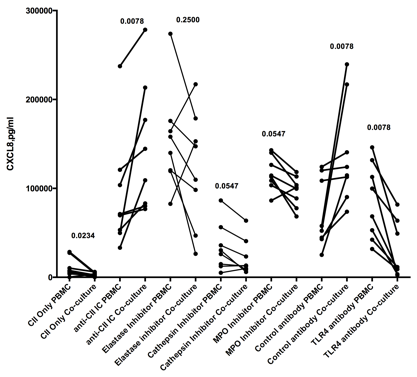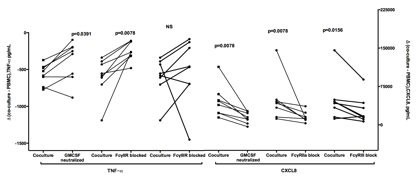Session Information
Session Type: ACR Poster Session B
Session Time: 9:00AM-11:00AM
Background/Purpose: RA patients with antibodies against collagen
type II (CII) have a distinct acute onset RA phenotype, associated with
cytokine induction by surface-bound anti-CII IC (Mullazehi A&R 2006,
Mullazehi ARD 2007, Mullazehi ART 2012). PMN
reactivity relate to early joint destruction in this phenotype (Manivel ART
2015). Hence we searched for CII-dependent mechanisms that might attract PMN to
the joint.
Methods:
Healthy donor PMN and peripheral
blood mononuclear cells (PBMC) were stimulated together (co-cultures) and
individually with surface-bound IC (anti-CII IC, tetanus toxoid (TT)/anti-TT
IC, plate-bound IgG) or GM-CSF. Blocking and neutralizing studies were
performed with antibodies against TLR4, FcgRIIa, FcgRIII and GM-CSF. Supernatant levels of
TNF-a and CXCL8 were analyzed with ELISA.
Results: PMN alone produced negligible cytokine
levels. TNF-a production was downregulated
in all co-culture systems compared to PBMC cultures. CXCL8 levels were specifically
upregulated in anti-CII IC-stimulated co-cultures
compared to parallel PBMC cultures (fig 1). The anti-CII IC augmentation of
CXCL8 was dependent on CII, as CXCL8 production was downregulated
in co-cultures stimulated with the other IC; plate-bound
IgG (fig 1) or TT/anti-TT IC (not shown). Blocking and neutralization studies
showed that the increase of CXCL8 in anti-CII IC stimulated co-cultures was
totally dependent on TLR4, partly on PMN enzymes (fig 2), FcgRIIa, FcgRIII (fig 3), and density of anti-CII
in IC. Like anti-CII IC, GM-CSF alone also induced co-culture-dependent CXCL8
enhancement (fig 1), and GM-CSF neutralization abrogated the anti-CII
IC-dependent CXCL8 enhancement (fig 3).
Conclusion: In anti-CII-positive RA patients, PMN amplify
local inflammation by inducing CXCL8. This mechanism
is dependent on TLR4, PMN enzymes, GM-CSF and the joint-specific autoantigen
CII. Local TLR4 blockade, PMN enzyme inhibition or GM-CSF neutralization might
be used to suppress acute joint inflammation.
Figure:1
Figure:2
Figure:3
To cite this abstract in AMA style:
Manivel VA, Sohrabian A, Rönnelid J. PMN Reactivity Contribute to Acute Onset Joint Inflammation By Increasing CXCL8 Production in Joints of RA Patients with Anti-Collagen II Antibodies [abstract]. Arthritis Rheumatol. 2015; 67 (suppl 10). https://acrabstracts.org/abstract/pmn-reactivity-contribute-to-acute-onset-joint-inflammation-by-increasing-cxcl8-production-in-joints-of-ra-patients-with-anti-collagen-ii-antibodies/. Accessed .« Back to 2015 ACR/ARHP Annual Meeting
ACR Meeting Abstracts - https://acrabstracts.org/abstract/pmn-reactivity-contribute-to-acute-onset-joint-inflammation-by-increasing-cxcl8-production-in-joints-of-ra-patients-with-anti-collagen-ii-antibodies/



